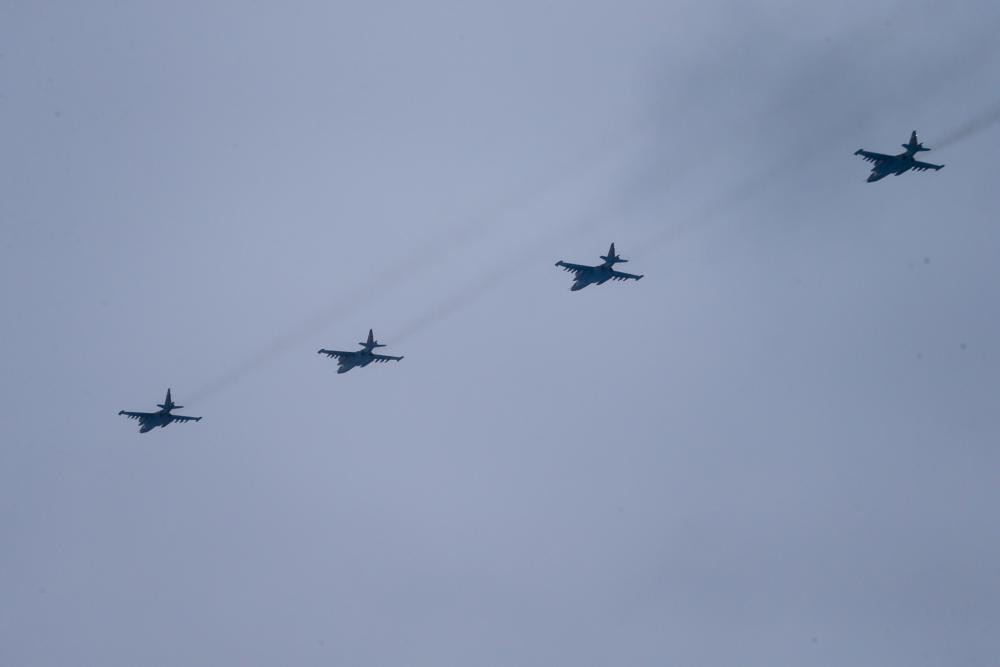Russia announced massive drills of its nuclear forces Friday amid soaring East-West tensions, as the U.S. issued some of its starkest, most detailed warnings yet about how a Russian invasion of Ukraine might unfold.
U.S. President Joe Biden sounded unusually dire a day earlier, as he warned that Washington saw no signs of a promised Russian withdrawal — but instead saw more troops moving toward the border with Ukraine.
“Every indication we have is they’re prepared to go into Ukraine, attack Ukraine,” Biden told reporters at the White House. He said the U.S. has “reason to believe” that Russia is “engaged in a false flag operation to have an excuse to go in,” but he did not provide details.
Some are concerned the longtime separatist conflict simmering in eastern Ukraine could provide just that cover. The area saw intensifying shelling and apparent cyberattacks over the past two days.
With tensions already at their highest level since the Cold War, the Russian military announced that President Vladimir Putin will monitor a sweeping exercise of the country’s nuclear forces Saturday that will involve multiple practice missile launches — a stark reminder of the country’s nuclear might amid the showdown with the West.
Youtube video thumbnail
Western fears focus on an estimated 150,000 Russian troops — including about 60% of Russia’s overall ground forces — posted around Ukraine’s borders. The Kremlin insists it has no plans to invade, but it has long considered Ukraine part of its sphere of influence and NATO’s eastward expansion an existential threat. Moscow’s key demand in this crisis is that NATO promise never to allow Ukraine to join — a move the Western alliance has roundly rejected.
Biden planned to speak by phone Friday with trans-Atlantic leaders about the Russian military buildup and continued efforts at deterrence and diplomacy.
U.S. Secretary of State Antony Blinken revealed some conclusions of U.S. intelligence, part of a strategy designed to expose and pre-empt any invasion planning. The U.S. has declined to reveal much of the evidence underlying its claims.
Blinken told diplomats at the U.N. Security Council that a sudden, seemingly violent event staged by Russia to justify an invasion would kick off the assault. Blinken mentioned a “so-called terrorist bombing” inside Russia, a staged drone strike, “a fake, even a real attack … using chemical weapons.”
The invasion would open with cyberattacks, along with missile strikes and bombs across Ukraine, Blinken said, describing the entry of Russian troops and their advance on Kyiv, a city of nearly 3 million, and other key targets.
At NATO headquarters in Brussels, U.S. Defense Secretary Lloyd Austin questioned the Russian troop pullout claims.
“We’ve seen some of those troops inch closer to that border,” he said. “We even see them stocking up their blood supplies. You don’t do these sort of things for no reason, and you certainly don’t do them if you’re getting ready to pack up and go home.”
Despite the stark U.S. warnings, Ukrainian officials sought to project calm, with Oleksii Danilov, head of the National Security and Defense Council, saying late Thursday that there were no signs a massive Russian invasion was imminent.
Nevertheless, U.S. and European officials were on high alert for any Russian attempts to create a pretext for invasion, according to a Western official familiar with intelligence findings. Ukrainian government officials shared intelligence with allies that suggested the Russians might try to shell the areas in the Luhansk region controlled by Moscow-backed separatists on Friday morning as part of an effort to create a false reason to take military action, according to the official who was not authorized to comment publicly.
The area saw a sharp spike in shelling Thursday, with monitors from the Organization for Security and Cooperation in Europe reporting more than 500 explosions before the tensions eased in the evening. Ukrainian authorities and separatists traded accusations of violations of a shaky truce in the nearly 8-year-old conflict in Ukraine’s eastern industrial heartland, called Donbas. The conflict erupted shortly after Russia’s 2014 annexation of the Ukrainian Crimean Peninsula and has killed 14,000.
The Ukrainian military command said shells hit a kindergarten in Stanytsia Luhanska, wounding two adults, and cut power to half the town. The rebels said nearly 19 houses were damaged by Ukrainian fire.
Early Friday, separatist authorities in the Luhansk and Donetsk regions reported more shelling by Ukrainian forces along the tense line of contact.
Ukrainian officials charged that the rebels intensified the shelling in the hopes of provoking a retaliatory attack by government forces.
The Ukrainian military chief, Valerii Zaluzhnyi, said that it’s “not planning any offensive operations or shelling of civilians,” adding that “our actions are purely defensive.”
But fears persist the violence could spark a wider conflict, and Western powers scrambled to avert, or prepare for, eventual invasion.
NATO’s defense ministers discussed ways to bolster defenses in Eastern Europe, while EU leaders huddled over how to punish Russia if it invades. Blinken and Vice President Kamala Harris are among political, military and diplomatic leaders heading to an annual security conference in Munich that will see urgent consultations on the crisis.
The U.S. and Russia also planned some talks in the coming days. Blinken is expected to meet his Russian counterpart next week, and Russia’s Defense Minister Sergei Shoigu is set to have a call with Austin on Friday, the Russian military said.
In the face of Western doubts over Russia’s assertion that it’s sending some forces back to bases, Moscow said the pullout would take time. Russia also made a new diplomatic overture Thursday, handing the U.S. a response to offers to engage in talks on limiting missile deployments in Europe, restrictions on military drills and other confidence-building measures.

